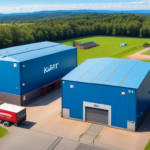Introduction to WestRock and DS Smith in the Packaging Industry
The packaging industry has experienced significant growth in recent years, driven by the surge in e-commerce and the increasing demand for safe and efficient packaging solutions. This competitive landscape features several key players, including WestRock and DS Smith, both of which are at the forefront of innovation and sustainability in packaging.
Packaging Industry Overview
The packaging industry encompasses various segments such as paper and paperboard, plastic, metal, and glass. According to a Research and Markets report, the global packaging market was valued at $1.05 trillion in 2022 and is projected to reach $1.25 trillion by 2028, growing at a CAGR of 3.4% during the forecast period.
Key applications within the packaging industry include food and beverages, healthcare, cosmetics and personal care, and more. Packaging plays a crucial role in ensuring product quality, safety, and protection during transportation and handling.
A notable trend is the rising demand for sustainable and eco-friendly packaging solutions. Consumers are increasingly aware of the environmental impact of packaging waste and prefer products with minimal packaging or packaging that can be easily recycled or biodegraded. This shift has led to a surge in the use of materials such as bioplastics, recycled paper, and compostable packaging. Companies are investing in research and development to create innovative, sustainable packaging that meets both consumer and environmental needs.
Company Profiles: WestRock and DS Smith
WestRock
WestRock is a leading provider of differentiated paper and packaging solutions. Established in 2015 through the merger of MeadWestvaco and RockTenn, WestRock operates in North America, South America, Europe, and Asia. The company serves diverse markets, including food and beverage, healthcare, and e-commerce.
WestRock is dedicated to sustainability, aiming to reduce its greenhouse gas emissions by 30% by 2030. The company emphasizes responsible sourcing of materials and has implemented programs to increase recycling and reduce waste.
DS Smith
DS Smith is a packaging company founded in 1940, operating in over 35 countries with a strong focus on the European market. DS Smith offers a wide range of packaging products, including corrugated packaging, plastics, and recycled paper, serving sectors such as e-commerce, retail, and manufacturing.
DS Smith has been recognized for its sustainability efforts, including being named a leader in sustainable packaging by the S&P Global Sustainability Index. The company has set a goal to manufacture 100% reusable or recyclable packaging by 2025 and has implemented a closed-loop recycling system to minimize waste and enhance the use of recycled materials.
Financial Performance Comparison
Market Capitalization
Market capitalization is a key metric used by investors to evaluate a company’s worth. As of April 2024, WestRock has a market cap of approximately $18 billion, while DS Smith stands at around $9 billion. WestRock's larger market cap indicates its bigger size in terms of assets and market presence.
However, market capitalization alone does not determine a company's value. Factors such as revenue, profit margins, and growth potential are also crucial in assessing a company's overall worth. Investors should consider a variety of metrics when evaluating investment opportunities.
Revenue Analysis
WestRock’s revenue in 2023 was $19.3 billion, reflecting a 9% increase from the previous year. In contrast, DS Smith’s revenue reached $8.1 billion in 2023, marking a 6% growth. While WestRock maintains a larger revenue base, DS Smith’s steady growth underscores its strong market presence.
Both companies are heavily investing in sustainable packaging solutions. WestRock announced a $5 million investment in a new recycling facility, while DS Smith committed to using 100% recycled or chain-of-custody certified paper by 2025. This focus on sustainability provides both companies with a competitive edge as consumer preferences shift towards environmentally responsible products.
Sustainability Initiatives
WestRock’s Sustainability Efforts
WestRock is committed to reducing its environmental footprint, aiming to lower greenhouse gas emissions by 30% by 2030. The company focuses on responsible sourcing of materials and has launched several programs to increase recycling rates and reduce waste. Recent initiatives include the development of sustainable packaging solutions made from renewable materials that are fully recyclable.
DS Smith’s Sustainability Efforts
DS Smith has been at the forefront of sustainable packaging, achieving recognition as a leader in sustainability through the S&P Global Sustainability Index. The company aims to produce 100% reusable or recyclable packaging by 2025 and has implemented a closed-loop recycling system to enhance the use of recycled materials and minimize waste. DS Smith’s investments in eco-friendly packaging options are designed to reduce both waste and carbon footprints, reinforcing their commitment to environmental responsibility.
Business Strategies and Growth Prospects
WestRock’s Strategy
WestRock’s business strategy revolves around delivering differentiated solutions to its customers, with a strong emphasis on sustainability and innovation. The company invests in new technologies to reduce environmental impact and lower costs, positioning itself as a leader in sustainable packaging solutions.
WestRock plans to grow through strategic acquisitions and investments in new technologies. The company is developing packaging that not only prioritizes sustainability but also enhances the customer experience.
DS Smith’s Strategy
DS Smith’s strategy focuses on providing sustainable packaging solutions and enhancing operational efficiency through investment in new technologies, sourcing sustainable materials, and collaborating with stakeholders. The company is expanding its global footprint and investing in sustainable packaging innovations to meet evolving market demands.
DS Smith is also investing in digital printing technology to offer personalized packaging, which is expected to drive growth in the coming years.
Leadership and Executive Profiles
WestRock Leadership
WestRock’s key executives include David B. Sewell (CEO), Ward H. Dickson (CFO), and Robert A. Feeser (COO).
David B. Sewell, CEO of WestRock, has been with the company since 1984 and has held various leadership positions prior to becoming CEO in 2015. He holds a Bachelor of Science in Chemical Engineering from the University of Tennessee and an MBA from the University of Chicago.
DS Smith Leadership
DS Smith’s leadership team includes Miles Roberts (CEO), Adrian R. Marsh (CFO), and John Moloney (Chairman).
Miles Roberts, CEO of DS Smith, has been with the company since 2010. Prior to joining DS Smith, he served as CEO of McBride plc and held various leadership roles at Rexam PLC. Roberts holds a Bachelor of Science in Mechanical Engineering from the University of Manchester and an MBA from INSEAD.
Comparative SWOT Analysis
A SWOT analysis provides insights into the strengths, weaknesses, opportunities, and threats facing both companies.
- WestRock
- Strengths: Robust product portfolio, strong market position, focus on sustainability.
- Weaknesses: High debt levels, exposure to commodity price fluctuations.
- Opportunities: Expansion into emerging markets, innovation in sustainable packaging.
- Threats: Competitive pressure, economic downturns affecting consumer spending.
- DS Smith
- Strengths: Focus on sustainability, operational excellence, customer-centric approach.
- Weaknesses: Limited geographic reach compared to global competitors.
- Opportunities: Strategic acquisitions, advancements in recycling technology.
- Threats: Volatile market conditions, changes in consumer behavior.
WestRock, despite its high debt levels, maintains a strong financial position through diversified revenue streams and cost-cutting measures. Investments in technology and innovation help WestRock stay ahead of competitors.
DS Smith has expanded its geographic reach through strategic acquisitions and partnerships, investing heavily in research and development to innovate sustainable packaging solutions. However, DS Smith remains vulnerable to volatile market conditions and economic downturns, which could impact its operations.
Investor Sentiment and Market Performance
Investor sentiment towards WestRock and DS Smith can be assessed by comparing their share prices and market performance. As of April 2024, WestRock’s share price is approximately $62.50, while DS Smith’s share price is around $6.10. WestRock’s higher share price reflects stronger investor confidence, likely due to its larger market capitalization and robust financial performance.
In terms of financial performance for 2023, WestRock outperformed DS Smith with a net income of $750 million and Earnings Per Share (EPS) of $2.30, compared to DS Smith’s net income of $220 million and EPS of $0.13. However, DS Smith demonstrated better revenue growth, with a 7% increase in 2023 compared to WestRock’s 4%, indicating an effective growth strategy.
Additionally, WestRock has a higher debt-to-equity ratio of 1.20 compared to DS Smith’s 0.85, which could make WestRock more susceptible to financial risks. Nevertheless, WestRock's diversified revenue streams help mitigate this risk.
Future Outlook and Growth Prospects
Both WestRock and DS Smith have promising growth prospects driven by the rise in e-commerce and the increasing demand for sustainable packaging. WestRock plans to expand through strategic acquisitions and investments in new technologies, while DS Smith focuses on expanding its global footprint and investing in sustainable packaging solutions.
Both companies are committed to research and development to create innovative packaging solutions that cater to evolving consumer needs. WestRock is developing packaging that prioritizes sustainability and enhances the customer experience, whereas DS Smith is investing in digital printing technology to offer personalized packaging, expected to drive growth in the coming years.
Conclusion: Future Outlook for WestRock and DS Smith
Both WestRock and DS Smith are significant players in the packaging industry. WestRock boasts a larger market cap and higher revenue, while DS Smith is renowned for its sustainability initiatives and operational excellence. Both companies exhibit strong growth prospects, driven by innovation and a commitment to sustainable solutions. As the packaging industry continues to expand, especially with the growth of e-commerce and heightened environmental awareness, WestRock and DS Smith are well-positioned to remain key players in the market’s future landscape.






















